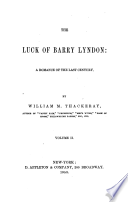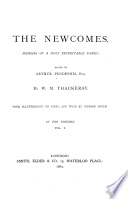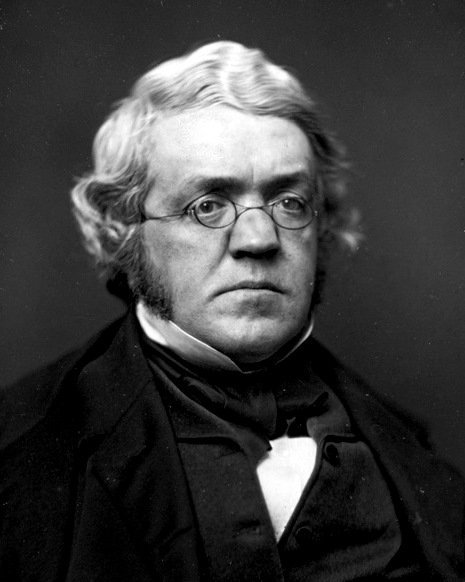Works

Vanity Fair
William Makepeace Thackeray
The Virginians
William Makepeace Thackeray
The History of Henry Esmond
William Makepeace Thackeray
The Luck of Barry Lyndon
William Makepeace ThackerayPendennis
William Makepeace Thackeray
The Newcomes
William Makepeace ThackerayFamous William Makepeace Thackeray Quotes
Bk. II, ch. 1.
The History of Henry Esmond (1852)
Source: The History of Henry Esmond, Esq.
William Makepeace Thackeray Quotes about love
“Thus love makes fools of all of us, big and little”
Source: The History of Pendennis (1848-1850), Ch. 4.
Vol. I, ch. 12.
Source: Vanity Fair (1847–1848)
Source: The History of Pendennis (1848-1850), Ch. 6.
Context: It is best to love wisely, no doubt; but to love foolishly is better than not to be able to love at all. Some of us can't: and are proud of our impotence, too.
Vol. I, ch. 13.
Source: Vanity Fair (1847–1848)
Source: The History of Pendennis (1848-1850), Ch. 40.
William Makepeace Thackeray Quotes about the world
“Which of us is happy in this world? Which of us has his desire? or, having it, is satisfied?”
Come, children, let us shut up the box and the puppets, for our play is played out. Vol. II, ch. 27.
Source: Vanity Fair (1847–1848)
Thackeray, William Makepeace. Nov. 1840, A Collection of Letters (1887). Ardent Media. p. 36.
“Dare, and the world always yields: or, if it beat you sometimes, dare again, and it will succumb.”
The Luck of Barry Lyndon (1844), Ch. 13.
Context: Let the man who has to make his fortune in life remember this maxim. Attacking is his only secret. Dare, and the world always yields: or, if it beat you sometimes, dare again, and it will succumb.
“The world is a looking-glass, and gives back to every man the reflection of his own face.”
Vol. I, ch. 2.
Vanity Fair (1847–1848)
Context: The world is a looking-glass, and gives back to every man the reflection of his own face. Frown at it, and it will in turn look sourly upon you; laugh at it and with it, and it is a jolly kind companion; and so let all young persons take their choice.
Source: The History of Pendennis (1848-1850), Ch. 30.
William Makepeace Thackeray: Trending quotes
“Mother is the name for God in the lips and hearts of little children.”
Vol. II, ch. 2.
Source: Vanity Fair (1847–1848)
“Remember, it's as easy to marry a rich woman as a poor woman.”
Source: The History of Pendennis (1848-1850), Ch. 28.
William Makepeace Thackeray Quotes
Vol. I, ch. 4. Compare: "I should like to see any kind of a man, distinguishable from a gorilla, that some good and even pretty woman could not shape a husband out of", Oliver Wendell Holmes, Sr., The Professor at the Breakfast Table; "The whole world is strewn with snares, traps, gins and pitfalls for the capture of men by women", Bernard Shaw, Epistle Dedicatory to Man and Superman.
Source: Vanity Fair (1847–1848)
Source: The Memoirs of Barry Lyndon, Esq. written by himself
“Stupid people, people who do not know how to laugh, are always pompous and self-conceited.”
Sketches and Travels in London; Mr. Brown's Letters to His Nephew: "On Love, Marriage, Men and Women" (1856).
“Women like not only to conquer, but to be conquered.”
Source: The Virginians (1857-1859), Ch. 4.
“How hard it is to make an Englishman acknowledge that he is happy!”
Pendennis. Book ii. Chap. xxxi, reported in Bartlett's Familiar Quotations, 10th ed. (1919).
“Good humour may be said to be one of the very best articles of dress one can wear in society.”
Sketches and Travels in London; Mr. Brown's Letters to his Nephew: "On Tailoring — And Toilettes in General" (1856).
Source: Sketches and Travels, Etc.
“Revenge may be wicked, but it’s natural.”
Source: Vanity Fair
Vol. I, ch. 19.
Source: Vanity Fair (1847–1848)
“A good laugh is sunshine in a house”
Variant: A good laugh is a sunshine in a house.
“Bravery never goes out of fashion.”
"George II".
Four Georges (1860-1861)
Source: Four Georges and the English Humourists
“A person can't help their birth.”
Source: Vanity Fair
“Tis strange what a man may do, and a woman yet think him an angel.”
Bk. I, ch. 7.
The History of Henry Esmond (1852)
The Rose and the Ring http://www.gutenberg.org/files/897/897-h/897-h.htm#2H_4_0004 (1855), Ch. 2.
“The true pleasure of life is to live with your inferiors.”
The Newcomes http://www.gutenberg.org/dirs/etext05/newcm10.txt (1853-1855), Ch. 9.
Ballads http://www.gutenberg.org/dirs/etext01/8bwmt10.txt, The Ballad of Bouillabaisse, st. 2 (1855).
The Age of Wisdom, reported in Bartlett's Familiar Quotations, 10th ed. (1919).
“Yes, I am a fatal man, Madame Fribsbi. To inspire hopeless passion is my destiny.”
Source: The History of Pendennis (1848-1850), Ch. 23.
A Credo, reported in Bartlett's Familiar Quotations, 10th ed. (1919).
The Mahogany Tree, reported in Bartlett's Familiar Quotations, 10th ed. (1919).
Source: The History of Pendennis (1848-1850), Ch. 42.
“It is to the middle class we must look for the safety of England.”
"George III".
Four Georges (1860-1861)
Source: The Virginians (1857-1859), Ch. 92.
“Next to the very young, I suppose the very old are the most selfish.”
Source: The Virginians (1857-1859), Ch. 61.
The narrator, LXII
Vanity Fair (1847–1848)
“Except for the young or very happy, I can't say I am sorry for any one who dies.”
Letter to Mrs. Bryan Waller Procter (26 November 1856), from The Letters and Private Papers of William Makepeace Thackeray, ed. Edgar F. Harden [Garland Publishing, Inc., 1994, ISBN 9780824036461], vol. 1, p. 763.
“The two most engaging powers of an author are to make new things familiar, familiar things new.”
In this work are exhibited in a very high degree the two most engaging powers of an author. New things are made familiar, and familiar things are made new. ~ Samuel Johnson, "The Life of Alexander Pope" from Lives of the English Poets (1781) http://www.gutenberg.org/dirs/etext04/lvpc10.txt
Misattributed
Source: The Virginians (1857-1859), Ch. 4.
“Despair is perfectly compatible with a good dinner, I promise you.”
Lovel the Widower (1860), Ch. 6.
“I think I could be a good woman if I had five thousand a year.”
Vol. II, ch. 6.
Vanity Fair (1847–1848)
The End of the Play, reported in Bartlett's Familiar Quotations, 10th ed. (1919).
Vol. I, ch. 9.
Vanity Fair (1847–1848)
“He who meanly admires mean things is a Snob.”
The Book of Snobs http://www.gutenberg.org/dirs/etext01/snobs10.txt (1848), ch. 2.
Sorrows of Werther, reported in Bartlett's Familiar Quotations, 10th ed. (1919).
Sorrows of Werther, reported in Bartlett's Familiar Quotations, 10th ed. (1919).
Vol. I, ch. 13.
Vanity Fair (1847–1848)
Pendennis: At the Church Gate, reported in Bartlett's Familiar Quotations, 10th ed. (1919).
The History of Pendennis (1848-1850)
“I never know whether to pity or congratulate a man on coming to his senses.”
Source: The Virginians (1857-1859), Ch. 56.
"George III"
Said by Princess Augusta to her son, George III
Four Georges (1860-1861)
Vol. I, ch. 21.
Vanity Fair (1847–1848)
